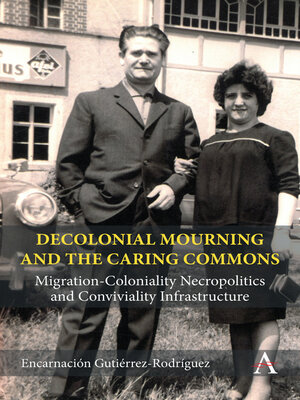Decolonial Mourning and the Caring Commons
ebook ∣ Migration-Coloniality Necropolitics and Conviviality Infrastructure · Anthem Studies in Decoloniality and Migration
By Encarnación Gutiérrez Rodríguez

Sign up to save your library
With an OverDrive account, you can save your favorite libraries for at-a-glance information about availability. Find out more about OverDrive accounts.
Find this title in Libby, the library reading app by OverDrive.



Search for a digital library with this title
Title found at these libraries:
| Library Name | Distance |
|---|---|
| Loading... |
This book is the product of an endless individual and collective process of mourning. It departs from the author's mourning for her parents, their histories and struggles in Germany as Gastarbeiter, while it also engages with the political mourning of intersectional feminist movements against feminicide inCentral and South America; the struggles against state and police misogynoir violence of #SayHerName in the United States; the resistance of refugees and migrantized people against the coloniality of migration in Germany; and the intense political grief work of families, relatives, and friends who lost their loved ones in racist attacks from the 1980s until today in Germany. Bearing witness to their stories and accounts, this book explores how mourning is shaped both by its historical context and the political labor of caring commons, while it also follows the building of a conviviality infrastructure of support against migration-coloniality necropolitics, dwelling toward transformative and reparative practices of common justice.
|This book is the product of an endless individual and collective process of mourning. It departs from the author's mourning for her parents, their histories and struggles in Germany as Gastarbeiter, while it also engages with the political mourning of intersectional feminist movements against feminicide in Central and South America; the struggles against state and police misogynoir violence of #SayHerName in the United States; the resistance of refugees and migrantized people against the coloniality of migration in Germany; and the intense political grief work of families, relatives, and friends who lost their loved ones in racist attacks from the 1980s until today in Germany. Bearing witness to their stories and accounts, this book explores how mourning is shaped both by its historical context and the political labor of caring commons, while it also follows the building of a conviviality infrastructrueof support against migration-coloniality necropolitics, dwelling toward transformative and reparative practices of common justice.







